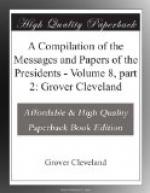The statutes of the United States which regulate the election of members of the House of Representatives, an essential part of which it is proposed to repeal by this bill, have been in force about eight years. Four Congressional elections have been held under them, two of which were at the Presidential elections of 1872 and 1876. Numerous prosecutions, trials, and convictions have been had in the courts of the United States in all parts of the Union for violations of these laws. In no reported case has their constitutionality been called in question by any judge of the courts of the United States. The validity of these laws is sustained by the uniform course of judicial action and opinion.
If it is urged that the United States election laws are not necessary, an ample reply is furnished by the history of their origin and of their results. They were especially prompted by the investigation and exposure of the frauds committed in the city and State of New York at the elections of 1868. Committees representing both of the leading political parties of the country have submitted reports to the House of Representatives on the extent of those frauds. A committee of the Fortieth Congress, after a full investigation, reached the conclusion that the number of fraudulent votes cast in the city of New York alone in 1868 was not less than 25,000. A committee of the Forty-fourth Congress in their report, submitted in 1877, adopted the opinion that for every 100 actual voters of the city of New York in 1868 108 votes were cast, when in fact the number of lawful votes cast could not have exceeded 88 per cent of the actual voters of the city. By this statement the number of fraudulent votes at that election in the city of New York alone was between thirty and forty thousand. These frauds completely reversed the result of the election in the State of New York, both as to the choice of governor and State officers and as to the choice of electors of President and Vice-President of the United States. They attracted the attention of the whole country. It was plain that if they could be continued and repeated with impunity free government was impossible. A distinguished Senator, in opposing the passage of the election laws, declared that he had “for a long time believed that our form of government was a comparative failure in the larger cities.” To meet these evils and to prevent these crimes the United States laws regulating Congressional elections were enacted.
The framers of these laws have not been disappointed in their results. In the large cities, under their provisions, the elections have been comparatively peaceable, orderly, and honest. Even the opponents of these laws have borne testimony to their value and efficiency and to the necessity for their enactment. The committee of the Forty-fourth Congress, composed of members a majority of whom were opposed to these laws, in their report on the New York election of 1876, said:




